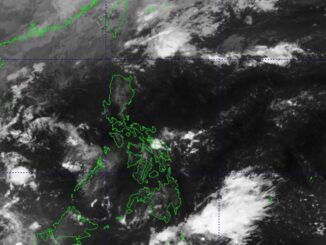
PRESIDENT Ferdinand Marcos Jr. on Monday witnessed the signing of the landmark Reciprocal Access Agreement (RAA), which ramps up defense cooperation between the Philippines and Japan amid escalating tensions in the South China Sea.
Marcos, joined by other key government officials from both countries, was present as the deal was formally sealed by Defense Secretary Gilberto Teodoro Jr. and Japan’s Foreign Minister Kamikawa Yoko in Malacañang.
The signing took place following the courtesy call of Kamikawa and Japan’s Defense Minister Kihara Minoru on President Marcos — in the country for the 2nd Foreign and Defense Ministerial Meeting (2+2), the highest consultative mechanism to further deepen security and defense policy coordination and security cooperation between the two countries.
RECIPROCAL ACCESS Japan Foreign Minister Kamikawa Yoko and Defense Secretary Gilberto Teodoro Jr. sign the Reciprocal Access Agreement between Philippines and Japan on July 8, 2024. Witnessing the signing are Japan’s Defense Minister Kihara Minoru, President Ferdinand Marcos Jr. and Foreign Affairs Secretary Enrique Manalo. PHOTO BY YUMMIE DINGDING/PPA POOL
“Your presence here increases our confidence and the importance that the Japanese government puts on these extremely important agreements that we have. And I’m very glad that we have come to this day,” Marcos told the Japanese officials.
The agreement allows more Japanese forces to take part in annual military exercises involving the Philippines and the United States, such as the “Balikatan” exercises.
Filipino forces, in turn, will be authorized to enter Japan for joint combat training.
The joint combat training to be held in Japan aims to further enhance the two nations’ defense cooperation.
Kamikawa tagged the defense pact as a “great achievement” that would help “maintain and strengthen the free and open international order based on the rule of law.”
Kihira, on the other hand, said he expects Japan and the Philippines to make great strides in defense cooperation and exchanges.
“The signature of the reciprocal access agreement today represents the cooperative relationship that our two nations enjoy. And I welcome this new development, which reinforces the effectiveness of our defense cooperation,” Kihara said.
“I am committed to working with my good colleague Secretary Teodoro to further enhance our defense cooperation and exchanges in order to realize a free and open Indo-Pacific,” he added.
The RAA, to take effect after ratification by the two countries’ legislatures, is the first such pact forged by Japan in Asia.
It is a commitment made at the inaugural PH-Japan Foreign and Defense Ministerial Meeting or 2+2 in April 2022, the Presidential Communications Office earlier said.
The first formal negotiations on the RAA were held in Tokyo on Nov. 29-30, 2023. It was led by the Department of National Defense along with delegations from the Department of Foreign Affairs and the Department of Justice.
Most senators welcomed the signing of the RAA, but leftist groups condemned it.
Sen. Juan Miguel Zubiri said the signing of the RAA would bolster the “defense interoperability” between the two countries as fellow senators expressed support for its ratification.
“It needs Senate ratification and we will support it absolutely,” Zubiri said in a statement on Monday. The signing of the RAA was “very timely and will boost the country’s defense interoperability with the friendly Asian neighbor.”
Senate President Francis Escudero, Senate President Pro Tempore Jinggoy Estrada, and fellow Senators JV Ejercito, Imee Marcos and Grace Poe, in separate text messages, also lauded the agreement.
However, Senate Minority Leader Aquilino Pimentel III was lukewarm to the RAA. “The Philippines should be entering more agreements of an economic nature instead of a military nature, which would allow us to sell Philippine-made and Philippine-grown products or items to other countries.”
Zubiri said the RAA would bolster the Philippines’ naval training and use of ships and equipment purchased from Japan. It would further strengthen the Philippines’ defense and security in the Asia-Pacific region.
“It was in 2022 when then-ambassador to the Philippines Koshikawa Kazuhiko and I first discussed the possibility of pursuing a reciprocal access agreement between our countries, and I brought this idea to President Marcos early into his administration,” Zubiri said.
“Japan is already an invaluable ally, and their assistance has been vital to the modernization of our Coast Guard and Navy. With this RAA, we can further strengthen our capacity-building through joint military exercises,” he added.
Sought for reaction on the newly signed defense deal, Escudero said: “Anything that strengthens and increases our military’s capability is a deterrence to a possible conflagration. I fully support this agreement.”
Ejercito said the RAA “is a welcome development in terms of security in the region and against China’s continued expansionism.” He added, “Since the Philippines is a Third World country, all the help and assistance we can get from traditional allies and like-minded nations is definitely much welcomed against China’s continued bullying and aggression towards us.”
Sen. Imee Marcos said she welcomed “having stronger security ties with our neighbors” in the Asia-Pacific region. However, Marcos said that as with other treaties, the Senate Committee on Foreign Relations, which she leads, would “scrutinize every line and every word of that treaty once the same is referred to us to make sure that it is aligned with the national interest of the country.”
Estrada, chairman of the Senate Committee on National Defense and Security, said he would see to it that the ratification of the RAA would be among the priority agenda of the Senate when it opens the 3rd Regular Session later this month.
“Any strategic partnership that strengthens our country’s close security relationship with a regional partner is an encouraging and welcome development,” he said.
Estrada said the RAA would play a crucial role in coordinating humanitarian assistance and disaster relief operations, given the frequent occurrence of natural disasters in the region requiring rapid and coordinated response efforts. Most of the newest vessels of the Philippine Coast Guard were acquired through a project funded by Japan to enhance maritime safety capabilities, he said.
“It’s important to cooperate with like-minded countries, especially our neighbors and uphold mutual interests,” Poe said in a text message.
Leftist groups staged a protest rally in front of the Japanese Embassy in Manila to condemn the “two-plus-two meeting” of Philippine and Japanese officials and the signing of the RAA.
Led by the Bagong Alyansang Makabayan (Bayan), the protesters declared that the RAA “will heighten Japanese militarism in the region and allow military intervention in the Philippines.
At the same time, they claimed that the agreement “poses a threat to our stability and will further provoke tension with China.”
Raymond Palatino, Bayan secretary general, said the RAA is similar to the Philippine-United States Visiting Forces Agreement (VFA) in that it will allow the Japanese Self Defense Forces (JSDF)’ official participation in the US-Philippines joint military exercises, including the annual Balikatan.





Be the first to comment